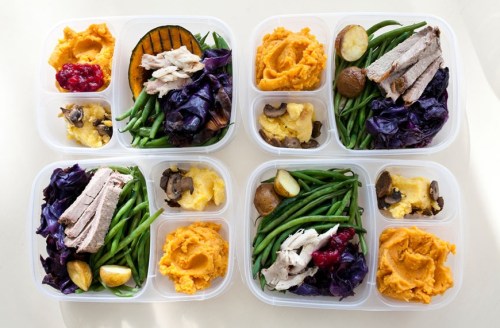PSA: Plastic food containers with these *three* recycling codes aren’t safe for your health
According to a just-released report from The American Academy of Pediatrics, plastic food containers that classified under recycling numbers 3, 6, and 7 aren't safe to use. They may lead to harmful chemicals getting your food. Here's what you need to know.

If your food-container collection still consists of plastics instead of glass, frequently recycling and replacing ’em is a must to protect yourself from consuming harmful chemicals—especially if you use the tools on the daily for meal prep. And the next time you’re perusing Amazon or your local grocery store for your next set, make sure to keep three different labels at top of mind, since new findings note they spell trouble for your hormones.
According to a just-released report from The American Academy of Pediatrics (AAP), plastics with the recycling numbers 3, 6, and 7 correspond to the endocrine system disruptors—AKA, harmful chemicals that can negatively affect the developmental, reproductive, neurological, and immune systems in humans—phthalates, styrene, bisphenols, respectively.
More than 10,000 chemicals are approved via regulation to come in contact with food in the U.S., and an estimated 1,000 more are designated as “generally recognized as safe” despite having no FDA approval.
The report, which the AAP published to shed light on food additives that present a threat to the health of children, proves concerning for people of all ages. Currently, more than 10,000 chemicals are approved via regulation to come in contact with food in the U.S. one way or another, and an estimated 1,000 more are designated as “generally recognized as safe” despite having no FDA approval. The problem? There’s significant evidence suggesting chemicals in food may lead to disease and disability—and young children are particularly at risk because their systems are still developing.
In action, all this info means that flipping over your plastic food containers to look for the not-so-healthy recycling numbers of 3, 6, and 7 is crucial. Because as the nitty-gritty details reveal, the specific corresponding chemicals present some scary risks. The phthalates in number 3 have been found in studies to produce insulin resistance and also might affect fetal reproductive development; styrene, found in number 6, is classified as a human carcinogen by the U.S. National Toxicology Program (NTP); and number 7 contains bisphenols, chemicals that have been known to impact fertility, heart disease, and more in high doses.
The AAP further notes that if the container holding your healthy desk lunch has a label that reads “biobased” or “greenware,” it’s safe to buy, no matter the number. And it might be time to spring for new, healthy set no matter what. After all, who wants a Pinterest-worthy lunch salad with a side of carcinogens?
Here’s what “plastic smog” is doing to our oceans. Plus, here are seven super-easy ways to reduce your plastic use.
Sign Up for Our Daily Newsletter
Get all the latest in wellness, trends, food, fitness, beauty, and more delivered right to your inbox.
Got it, you've been added to our email list.










